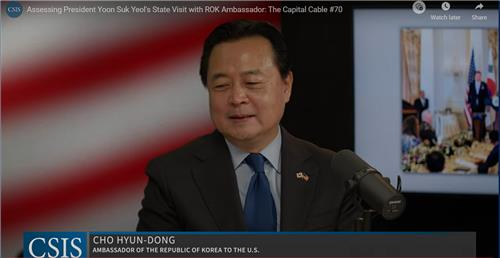 |
South Korea's ambassador to the United States, Cho Hyun-dong, is seen speaking during a seminar hosted by the Center for Strategic and International Studies in Washington on Thursday. (Center for Strategic and International Studies) |
WASHINGTON -- South Korean President Yoon Suk Yeol's recent visit to the United States has opened a new chapter for the 70-year-old alliance, Seoul's top envoy to the US said Thursday.
South Korea's ambassador to the US Cho Hyun-dong also insisted that the countries have upgraded their mutual defense treaty signed in 1953.
"I think the state visit by President Yoon, I'd say, opened a new chapter for the 70-year-old alliance toward a greater and brighter future of the alliance. He put forward a vision of alliance and action toward the future," the ambassador said in a seminar hosted by the Center for Strategic and International Studies, a think tank based in Washington.
Yoon made a week-long state visit to the US last week, during which he and US President Joe Biden signed an agreement on strengthening US extended deterrence, which refers to US commitment to the defense of South Korea using all its military capabilities, including nuclear, when necessary.
The agreement, dubbed the "Washington Declaration," is an upgraded version of the 1953 Korea-US mutual defense treaty, Cho insisted.
"We have upgraded our security alliance. The two presidents announced the Washington Declaration on top of the joint statement, which is a very unique and unprecedented document that the United States has signed with any other partner or ally," Cho told the seminar.
"This is the evolution of the mutual defense treaty, which was signed in 1953. The mutual defense treaty was a reflection of the security situation that time, but this one is another reflection of the security situation on the Korean Peninsula today," he added.
The Washington Declaration calls for increased visibility of US commitment to the security of South Korea, according to Cho.
To this end, the US has agreed to send a nuclear-powered ballistic missile submarine to South Korea for the first time since the early 1980s, and also "more regularly" deploy US strategic assets to South Korea and the surrounding region.
North Korea has reacted furiously to the declaration, vowing to further bolster its own nuclear deterrence.
Cho argued Pyongyang's reaction proves how effective the joint declaration is.
"When you talk about reaction to the Washington Declaration, look at what's coming out from Pyongyang. They have released a number of statements since (the) adoption of the Washington Declaration with harsh rhetoric, hysterical languages. That could also attest how effective and how strong this declaration is," he said.
China has also expressed its dislike of the joint declaration, which may increase US military presence in the region.
Cho said Seoul will continue to engage with China.
"China is the closest neighbor to Korea and that will not change. And China has been the number one trading partner with South Korea and will remain as it is for quite a long time," he said.
"So we have to maintain good relations with China. I have no doubt about that," added Cho. "We will definitely engage with China, and there will be opportunities for high-level exchanges between Seoul and Beijing." (Yonhap)







